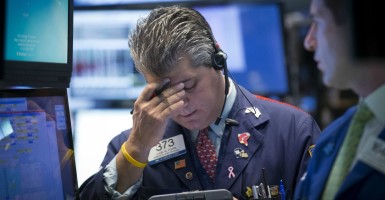U.S. stock markets plummeted Monday, furthering a global market decline that has eliminated nearly $10 trillion from international shares as concerns grow over China’s economic health.
The Dow Jones industrial average plunged more than 1,000 points soon after trading began, continuing losses from last week that marked the worst for U.S. stocks in four years.
The global market fell sharply after China devalued its currency two weeks ago, evoking apprehension from investors that the world’s second-largest economy was not as strong as state estimates reported.
William Wilson, a senior research fellow specializing in Asian studies at The Heritage Foundation, noted the most recent state estimates claimed China was growing at 7 percent, but said many now believe those numbers were “fudged.” He said China is likely growing at 4 percent or 5 percent and slowing.
Worries intensified Monday as Shanghai’s composite index plunged 8.5 percent—its largest one-day drop since February 2007. The state-run news agency Xinhua said China was experiencing a “Black Monday” after the stock’s lowest decline in 8 years was recorded.
Black Monday! #ChinaStocks join global panic selloff, dive 8.5%, worst since Asian financial crisis at midday pic.twitter.com/nLHoFf34bV
— China Xinhua News (@XHNews) August 24, 2015
Stocks also nosedived across Europe and Asia as the main indexes in Germany, France, the United Kingdom, Japan and Hong Kong dropped by 4 percent or more.
Wilson said a global fall-off is occurring because of China’s economic scope. It is the world’s second-largest importer and has accounted for a third of global economic growth for the past five years—more than any other country in the world. China is also the largest trading nation for 75 countries.
“When there are growth concerns in China there are obviously growth concerns at the global economy, and this is exactly what we’re seeing,” he said.
He predicted that China will have a harder time mediating the current economic “crisis” than it did in 2009 because of the state’s “enormous” run up in debt, its interest rate cuts, and its continued use of stimulus packages.
“None of it is working and they’re getting desperate,” Wilson said. “I think you’ll see further weakening of the exchange rate because they don’t have anymore policy tools.”
Despite Monday’s stock market numbers, Wilson said those in the U.S. should not panic.
“Economic growth isn’t tied that tightly to the Chinese economy,” he said. “The Chinese economy could actually hit a hard landing and the U.S. economy wouldn’t necessarily go into a recession, we could continue growing,”






























